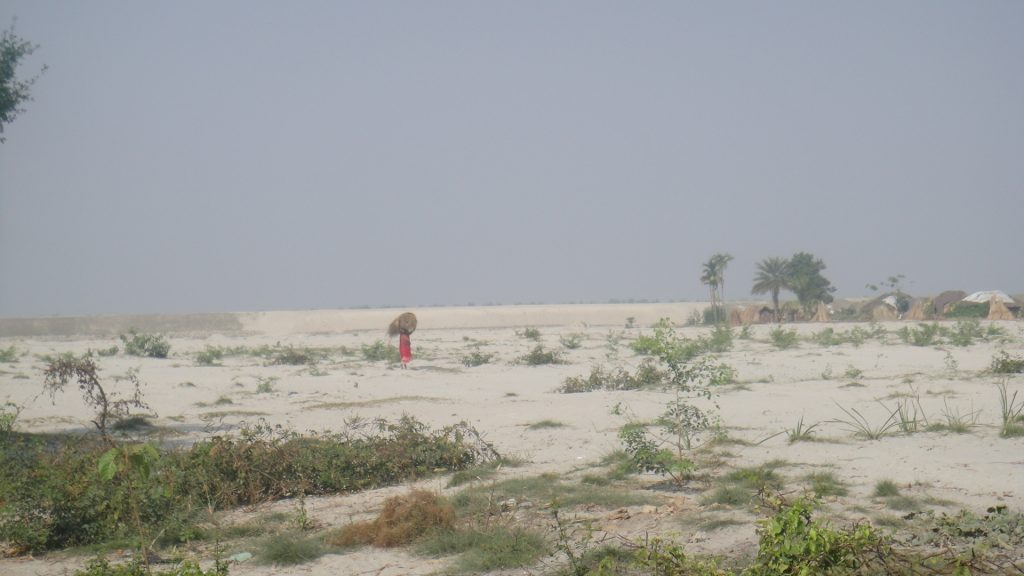Lisa Ellram, Ph.D.
Fulbright Distinguished Scholar of Economics and Business

Climate refugees. These are people who are displaced, who have been forced to leave their homes due to the effect of climate change on the environment. I have heard of this term in passing a number of times, but have not thought much about it until lately. I have heard about it a great deal the past few months. I have spent the last three plus months visiting Hanken University in Helsinki as a Fulbright Distinguished Scholar of Economics and Business. I have been working in the area of supply chain management throughout my career, and am very interested in sustainability and human impact on climate change. Of course there is also a huge climate change impact on people.
I study sustainability and climate change it mainly from the perspective of what businesses are doing with regard to the impact of their activities on climate change. The good news is that businesses are talking—and many are acting more than ever to reduce their impact in the natural environment. Every day, new businesses commit to the Science-Based Target Initiative™(SBTi), where they develop substantive plans for cutting today’s carbon emissions in half by 2030, and meeting the UN’s target of net carbon neutrality by 2050.[1]
Yet, as we prepare and begin to get our carbon output in line to save the planet, it is too late in some places. As early as 2018, the World Bank warned that the growing climate crisis could displace 143 million
people by 2050, [2] while recent estimates from other sources indicate even higher numbers. What is
happening, and what can be done?
First, I use the word climate refugee here to indicate people who have to leave their home because of environmental events. The term climate migrant doesn’t set the proper tone for urgency. It sounds too voluntary, like “I may want to move somewhere else to get better weather.” For example, a friend/colleague of mine recently indicated that his 20-something daughter and husband are leaving Arizona due to the negative impacts of climate change (heat and water shortage) in the state, convinced that it will only get worse. That meets the definition of climate migration and most of us have empathy for the desire to move for those reasons. However, what about the person whose home has been destroyed by a hurricane, in an area where hurricanes are occurring with increased regularity? Or a person whose house is now in a flood zone, and has been advised to move? What about a person who lives in a place with constant drought, and no end in sight, and has already had to move because there is no work, no food, no water? Does this qualify as a climate refugee?
One of the problems with the status of climate refugee is that it currently does not have an agreed upon definition. And some organizations are fighting to legitimize the and formalize the term and status of climate refugee, while others are resisting the acknowledgement of the status “climate refugee.”[3] Both sides have good reasons for their stance. The side in favor of acknowledging climate refugees as a formal status argue that this is a real and growing problem that needs to be acknowledged. These refugees should be granted rights and displaced person status like other refugees. They should be eligible for humanitarian relief as displaced persons. The problem has not yet come to a head because many of the climate refugees have sought to resettle elsewhere in their own country, or wait for return home within their own country. On the other side, a complicating factor to refugee status is that climate change is often an additive factor contributing to displacement, as climate change exacerbates other problems such as job losses, water and food shortages. [4] In addition, many countries really do not want to feel like they must take in additional refugees, and denying refugee status is a way to make the entry of migrants more voluntary and less politically charged. Further, it is noted that this could make it more difficult for other refugees who are fleeing for issues of more immediate urgency might be put at a disadvantage in terms of humanitarian relief if a vast number of people became “climate refugees” rather than climate migrants. [5]
Clearly, this is a complex problem, and an emotionally-charged problem. While the issue is not being ignored, it is also not being addressed head-on. To complicate matters further, not all climate refugees want to migrate. There are potential climate refugees, or migrants, in very challenging conditions due to climate change that have no interest in leaving their home country. Do we have the will, and the resources to relocate people who fit intothis category? [6] The answer to both of these questions is probably not.
So what needs to be done? The obvious, but difficult solution is to slow down and stop the effects of climate change as fast as we possibly can, in an effort to slow down the effects of climate change. Climate change is not a laboratory experiment. Once we hit a certain level of GHG and climate impact—in terms of drought, extinctions, desertification and related issues, we won’t be able to turn the effects back even if we halt emissions of manmade GHG, which seems unlikely in the near term. The problem of climate change needs to be acted on at a swifter pace, which will require global cooperation the likes of which we have not seen since the ozone crisis. [7] This must be an ongoing effort.
In the meantime, the countries that are suffering the most outsized effects of climate change are asking for help. They maintain that it was the developed world that has contributed most robustly to climate change. They do not have the same growth economic opportunities as developed nations, yet they are now receiving the brunt of climate change impact in terms of extreme weather conditions, drought, and related issues. They want reparations, and ways to pay to support relief for the refugee crises that they face within their own borders due to the impacts of climate change. Climate reparations are meant to help pay for the economic costs of damages incurred due to the toll that accelerating climate change disasters have reeked on a country. These problems can hamper future economic growth. At this time, the funding is not meant to pay for mitigation of future problems—but rather to help offset the damage that could not be prevented through mitigation or adaptation. While developing nations have blocked this discussion as recently as 2021, it now has support as an agenda item at the UN, and is backed by a coalition of 134 developing nations known as the G77, plus China. [8]
This is a topic is not going away, but may become more heated as indigenous people also demand reparations for the impact on their communities due to climate change and climate injustice. [9] The good news for those displaced by climate change now and in the future is that this issue currently has global attention, and can’t be blocked as a topic from global climate summits. Climate reparations have been discussed at COP26[10], brought up at COP27 and were part of a call to action at COP28. [11] Companies and countries are also acting towards reducing the impact of climate change. We need to have this conversation and face the implications and remedies with our eyes wide open. We can’t slow the momentum now.

Lisa Ellram is the Fulbright Distinguished Scholar in Economics and Business at the Hanken School of Economics. Professor Lisa Ellram focuses her work and studies on circular supply chains, sustainable economy, and environmentally conscious business practices. When not in Helsinki, Finland, she is a co-editor of the Journal of Supply Chain Management, and is a University Distinguished Processor at Miami University in Ohio.
Interested in becoming the next Hanken Fulbright scholar? Find more information here: https://www.hanken.fi/en/external-cooperation/international-networks/fulbright
[1]
For more information, see Science Based Target Initiatives at https://sciencebasedtargets.org/
[2]
John Podesta , The climate crisis, migration, and refugees. Brookings
Institute. July 25, 2019. https://www.brookings.edu/research/the-climate-crisis-migration-and-refugees/
[3] Mia
Prange Climate Change Is Fueling Migration. Do Climate Migrants Have Legal
Protections? Council on Foreign Relations, Last updated December 19, 2022. https://www.cfr.org/in-brief/climate-change-fueling-migration-do-climate-migrants-have-legal-protections
[4] Rachel Dobbs, Climate change is likely to
increase migration. The Economist, November 22, 2022. https://www.economist.com/the-world-ahead/2022/11/18/climate-change-is-likely-to-increase-migration?utm_medium=cpc.adword.pd&utm_source=google&ppccampaignID=17210591673&ppcadID=&utm_campaign=a.22brand_pmax&utm_content=conversion.direct-response.anonymous&gclid=Cj0KCQjwmN2iBhCrARIsAG_G2i5ZV8B6aBXNotpee2flLMg4xDICBKcPwW4g8cQT6p1wkLzfyrWeVygaAqOpEALw_wcB&gclsrc=aw.ds
[5]
Dina Ionesco. Let’s Talk About Climate
Migrants, Not Climate Refugees, United Nations. June 6, 2019. https://www.un.org/sustainabledevelopment/blog/2019/06/lets-talk-about-climate-migrants-not-climate-refugees/
[6]
Abrahahm Lustgarten, The Great Climate Migration has begun. New York Times
Magazine, July 23, 2022. https://www.nytimes.com/interactive/2020/07/23/magazine/climate-migration.html
[7]
Kelsey Piper, Why the ozone hole is on track to be healed by mid-century. Vox,
January 10, 2023. https://www.vox.com/future-perfect/22686105/future-of-life-ozone-hole-environmental-crisis-united-nations-cfcs
[8] Sarah Schonhardt. 5 things you should know
about Climate change Reparations. Scientific American, October 22, 2022. https://www.scientificamerican.com/article/5-things-to-know-about-climate-reparations/
[10]
COP refers to the U.N. Climate Change Conference.
[11] T.
Ida, Climate refugees – the world’s
forgotten victims. World Economic Forum. 2021, June 18. Retrieved from https://www.weforum.org/agenda/2021/06/climate-refugees-the-world-s-forgotten-victims/;
United nations. UNHCRS Grandi
urges world leaders not to forget displaced people. UNHCR, November 7, 2022. https://www.unhcr.org/news/news-releases/unhcrs-grandi-urges-world-leaders-not-forget-displaced-people-cop27;
COP28 President-Designate Calls for Climate Action that Hits 2030 Targets,
Unlocks Climate Finance, and Leaves No One Behind, PR Newswire, May 2, 2023.
https://finance.yahoo.com/news/cop28-president-designate-calls-climate-180100095.html?guccounter=1&guce_referrer=aHR0cHM6Ly9kdWNrZHVja2dvLmNvbS8&guce_referrer_sig=AQAAAJf0Qixb6NhFgrTL5ti6R0fV5qyoP9lWt1QpKOPTxy6B1KNTt7Bpz4lI8rkWCrh3NQdxfXIdodcV9TyiujvwkhhAp68zWLTmO2s_HrjXCpsqqNgVo_DFSa4n7ODqhvU8MSpVbvPOPi5-Cg2RE0zKeuA9lg6ibsGUsqZ59MWT_T0q


